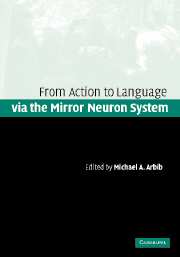Book contents
- Frontmatter
- Contents
- List of contributors
- Preface
- Part I Two perspectives
- 1 The Mirror System Hypothesis on the linkage of action and languages
- 2 The origin and evolution of language: a plausible, strong-AI account
- Part II Brain, evolution, and comparative analysis
- Part III Dynamic systems in action and language
- Part IV From mirror system to syntax and Theory of Mind
- Part V Development of action and language
- Index
- References
2 - The origin and evolution of language: a plausible, strong-AI account
Published online by Cambridge University Press: 01 September 2009
- Frontmatter
- Contents
- List of contributors
- Preface
- Part I Two perspectives
- 1 The Mirror System Hypothesis on the linkage of action and languages
- 2 The origin and evolution of language: a plausible, strong-AI account
- Part II Brain, evolution, and comparative analysis
- Part III Dynamic systems in action and language
- Part IV From mirror system to syntax and Theory of Mind
- Part V Development of action and language
- Index
- References
Summary
Framework
In this chapter I show in outline how human language as we know it could have evolved incrementally from mental capacities it is reasonable to attribute to lower primates and other mammals. I do so within the framework of a formal computational theory of language understanding (Hobbs et al., 1993). In the first section I describe some of the key elements in the theory, especially as it relates to the evolution of linguistic capabilities. In the next two sections I describe plausible incremental paths to two key aspects of language − meaning and syntax. In the final section I discuss various considerations of the time course of these processes.
Strong AI
It is desirable for psychology to provide a reduction in principle of intelligent, or intentional, behavior to neurophysiology. Because of the extreme complexity of the human brain, more than the sketchiest account is not likely to be possible in the near future. Nevertheless, the central metaphor of cognitive science, “The brain is a computer,” gives us hope. Prior to the computer metaphor, we had no idea of what could possibly be the bridge between beliefs and ion transport. Now we have an idea. In the long history of inquiry into the nature of mind, the computer metaphor gives us, for the first time, the promise of linking the entities and processes of intentional psychology to the underlying biological processes of neurons, and hence to physical processes.
Information
- Type
- Chapter
- Information
- Action to Language via the Mirror Neuron System , pp. 48 - 88Publisher: Cambridge University PressPrint publication year: 2006
References
Accessibility standard: Unknown
Why this information is here
This section outlines the accessibility features of this content - including support for screen readers, full keyboard navigation and high-contrast display options. This may not be relevant for you.Accessibility Information
- 2
- Cited by
